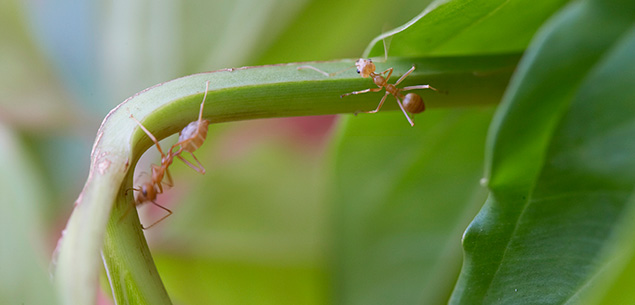I’ve always been a wimp about killing things. The Partner despairs of ever getting his turn in the shower, because I have to move all the daddy longlegs to safety before I turn the water on.
I chase flies out of the house rather than spray them, speak gently to bugs and beetles, and apologise to anything I kill by accident.
Unlike most people, I’m completely indiscriminating, so ants are entitled to the same treatment as butterflies and bees.
Most people think I’m nuts, but I’ve been exonerated by Eric Grissell, a retired US entomologist, who has written a book about insects that are valuable partners in the garden – and ants are up there with the best of them.
I’m very pleased about this, because the Partner does not love ants in the house or the garden. I have to wrestle the fly spray from him to stop him blitzing ants doing conga lines on the kitchen bench and making wee sand mountains between the pavers in the courtyard – but now I’ll be able to convince him of their worth.
When you disturb an ant colony in the garden, don’t assume they’re just sitting around discussing how best to infiltrate your pantry while you’re at the supermarket.
They aerate and mix the soil, enhance water infiltration, and recycle and incorporate dead or dying organic matter and nutrients. And that’s not all.
These groovy little gardeners also have a role to play in planting. They actively disperse seeds of hundreds of herbaceous plants, and maybe many more. Trilliums, violas and corydalis, for example, produce seeds that are coated with nutrients. These are the ant equivalent of gourmet takeaways, so they carry them home, feed them to the family, and the seeds eventually germinate some distance from their original patch.
And anyway, ants are really interesting. A colony consists of queens, males and workers (wingless females). The males have wings and fly in swarms with young queens. Once mated, a queen drops to the ground and chews off her wings. It sounds brutal but in fact the wings are no longer useful to her since she’ll spend the rest of her life in a hole in the ground raising her family. No different than shrugging off a backpack, then.
I’m not the only one who is fascinated by ants. Russian photographer Irina Kozorog has created a series of pictures of ants occupying a fantasy land by putting them into bizarre scenes so they seem to act out human-like activities, such as building snowmen, kissing on a bridge and arguing in a boardroom. Check out her photos online.
Next time you find an ant exploring the hairs on your arm, I bet you’ll be inclined to blow it away rather than smack it.




